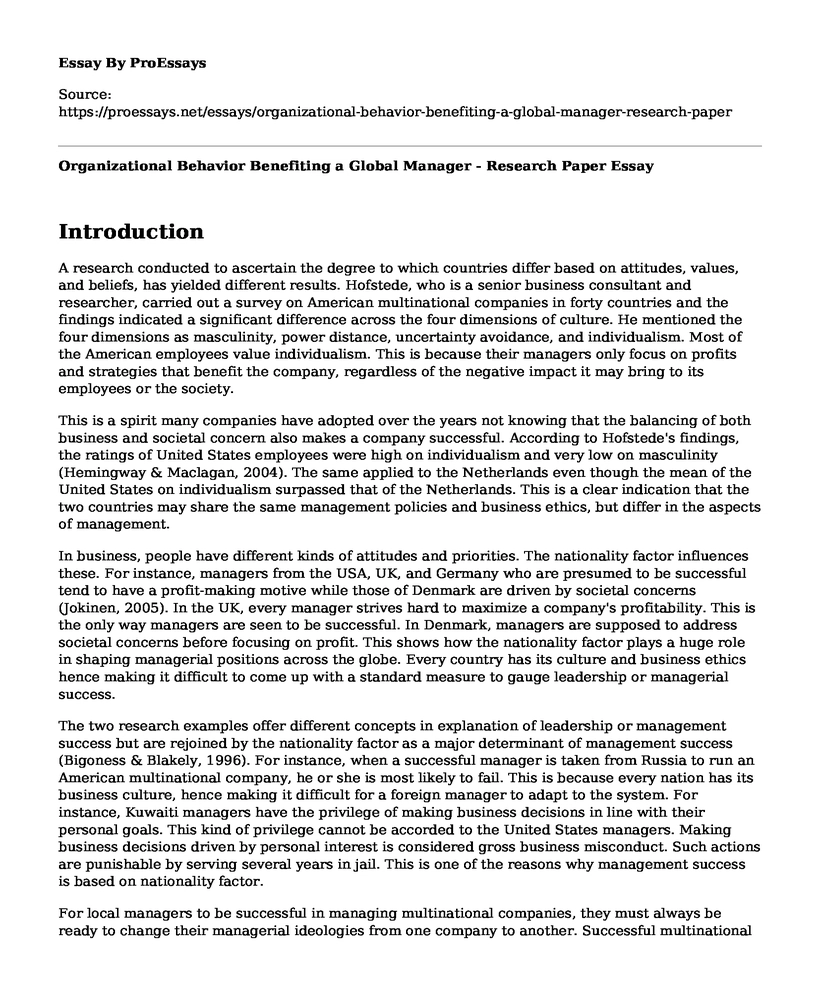Introduction
A research conducted to ascertain the degree to which countries differ based on attitudes, values, and beliefs, has yielded different results. Hofstede, who is a senior business consultant and researcher, carried out a survey on American multinational companies in forty countries and the findings indicated a significant difference across the four dimensions of culture. He mentioned the four dimensions as masculinity, power distance, uncertainty avoidance, and individualism. Most of the American employees value individualism. This is because their managers only focus on profits and strategies that benefit the company, regardless of the negative impact it may bring to its employees or the society.
This is a spirit many companies have adopted over the years not knowing that the balancing of both business and societal concern also makes a company successful. According to Hofstede's findings, the ratings of United States employees were high on individualism and very low on masculinity (Hemingway & Maclagan, 2004). The same applied to the Netherlands even though the mean of the United States on individualism surpassed that of the Netherlands. This is a clear indication that the two countries may share the same management policies and business ethics, but differ in the aspects of management.
In business, people have different kinds of attitudes and priorities. The nationality factor influences these. For instance, managers from the USA, UK, and Germany who are presumed to be successful tend to have a profit-making motive while those of Denmark are driven by societal concerns (Jokinen, 2005). In the UK, every manager strives hard to maximize a company's profitability. This is the only way managers are seen to be successful. In Denmark, managers are supposed to address societal concerns before focusing on profit. This shows how the nationality factor plays a huge role in shaping managerial positions across the globe. Every country has its culture and business ethics hence making it difficult to come up with a standard measure to gauge leadership or managerial success.
The two research examples offer different concepts in explanation of leadership or management success but are rejoined by the nationality factor as a major determinant of management success (Bigoness & Blakely, 1996). For instance, when a successful manager is taken from Russia to run an American multinational company, he or she is most likely to fail. This is because every nation has its business culture, hence making it difficult for a foreign manager to adapt to the system. For instance, Kuwaiti managers have the privilege of making business decisions in line with their personal goals. This kind of privilege cannot be accorded to the United States managers. Making business decisions driven by personal interest is considered gross business misconduct. Such actions are punishable by serving several years in jail. This is one of the reasons why management success is based on nationality factor.
For local managers to be successful in managing multinational companies, they must always be ready to change their managerial ideologies from one company to another. Successful multinational managers are those who change their business strategies in line with the company beliefs and goals. For instance, when a local Russian manager is contracted to manage a multinational company such as Toyota, he/she must first learn the policies that govern the corporation and align him/herself with the business culture that the corporation ascribes to. This is the only way a local manager can rise to run a multinational company. A good manager should always be flexible regarding business strategies and beliefs.
References
Bigoness, W. J., & Blakely, G. L. (1996). A Cross-National Study of Managerial Values. Journal of International Business Studies, 27 (4), 739-748.
Hemingway, C. A., & Maclagan, P. W. (2004). Managers Personal Values as Drivers of Corporate Social Responsibility. Journal of Business Ethics, 50 (1), 33-44.
Jokinen, T. (2005). Global leadership competencies: A review and discussion. Journal of European Industrial Training, 29 (3), 199-216.
Cite this page
Organizational Behavior Benefiting a Global Manager - Research Paper. (2022, Aug 15). Retrieved from https://proessays.net/essays/organizational-behavior-benefiting-a-global-manager-research-paper
If you are the original author of this essay and no longer wish to have it published on the ProEssays website, please click below to request its removal:
- Data Privacy Law: Comparison Between the United States and Saudi Arabia
- Ethical and Sustainable Sourcing Essay
- Research Paper on Red Bull Energy Drink Company Strategic Planning
- Incivility in the Work Place Essay Example
- Research Paper on Disney's Low-Cost Integrated Differentiation Strategy
- Essay Example on Project Managers: Gather & Report Data for Successful Projects
- Free Report Example on Apple: Essential HR Change Initiative for Maximizing Potential







